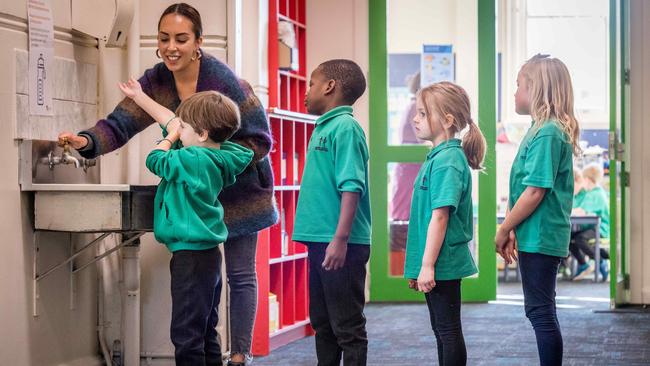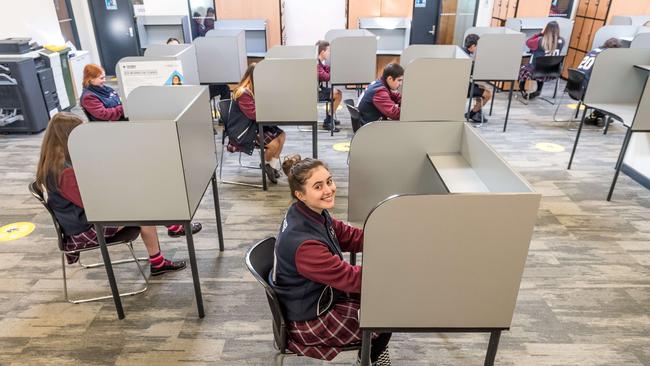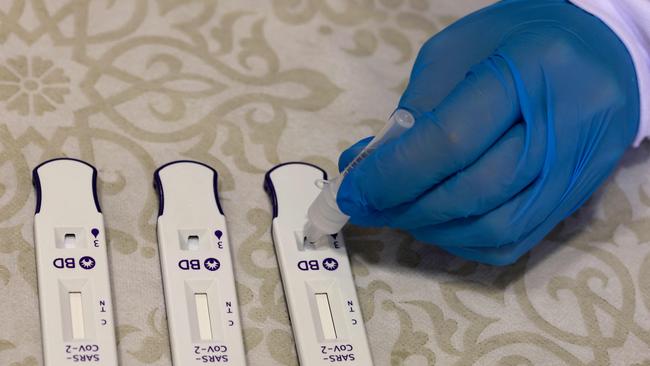Rapid antigen Covid-19 testing can keep kids in school, experts say
There are growing calls for Victorian students and teachers to have rapid antigen Covid tests to keep schools open in future outbreaks.
Education
Don't miss out on the headlines from Education. Followed categories will be added to My News.
Leading experts are calling for rapid antigen Covid-19 testing in Victorian schools to avoid further disruptions amid ongoing outbreaks.
It comes as teachers and school staff in California will now be required to be fully vaccinated or undergo weekly tests.
Since March, schools in the UK have offered twice weekly rapid tests to all pupils, with those testing positive having to self-isolate, along with close contacts, for 10 days.
More than one million Victorian students have lost up to two terms of face-to-face learning – more than in any other state – since the start of the pandemic.

Eleven Victorian schools have also been exposed to positive Covid-19 cases during the latest outbreak.
Murdoch Children’s Research Institute group leader Professor Fiona Russell, who led a study of COVID-19 school closures last year, said rapid testing would lead to less disruptions.
“Many countries including Germany are using rapid testing … because they recognise the importance of keeping schools open and putting in measures to minimise disruptions,” she said.
Former World Health Organisation epidemiologist and University of South Australia Professor Adrian Esterman said he supported rapid testing and teachers being prioritised for the vaccine.
“Teachers should be near the top of the list for the vaccine. Anything we can do including rapid testing is going to be a great help,” Prof Esterman said.

“We haven’t taken up rapid testing in Australia, one of the reasons is up until recently rapid tests haven’t been as accurate as PCR tests but they’re cheap, available and they’re getting more accurate.”
Deakin University chair in epidemiology Professor Catherine Bennett said the risk for infection among children was now “quite real” for children.
“We are seeing spreads in schools in ways we just did not with previous variants. Teachers are frontline workers … the very people they’re working with are children of essential workers who could potentially bring the virus to school,’ Prof Bennett said.
“We’re all hoping that the vaccination rates in adults will be high enough, so we can look at schools as a separate issue.”

Australian Education Union Victorian Branch President Meredith Peace said it was clear that there were a variety of public health measures, including rapid testing regimes and stronger requirements around frontline staff vaccination, being adopted by jurisdictions overseas.
“Discussion and speculation about these issues is simply a distraction from the fact that the Morrison government has failed to secure vaccine supply, to have a clear plan to vaccinate priority groups and to communicate with the community effectively,” Ms Peace said.
“The overwhelming message we hear from our members is that they want to be vaccinated, and they want to be back in their classrooms with their students as soon as it is safe.”
Parents Victoria executive officer Gail McHardy said families and schools were doing their best under the circumstances and continued to surprise them with their resilience.
“Parents Victoria would expect our medical experts and governments would be assessing various models used elsewhere in order to minimise Covid impact on us all,” she said.
A Department of Health spokesman said: “We know vaccinations are our path out of this pandemic, which is why we have opened AstraZeneca at our state-run vaccination centres to every Victorian 18 years and older.”
“Victoria would love to see every teacher that wants to get vaccinated, get vaccinated, but the reality is we don’t have the supply – the biggest barrier to any priority vaccination rollout is the limited Pfizer vaccine supply Victoria continues to receive from the Commonwealth,” he said.




